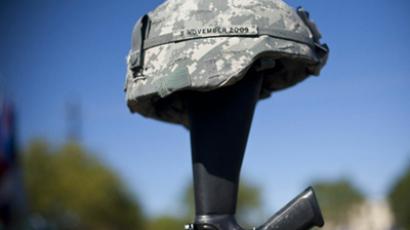‘Man of Mass Destruction’? RT challenges Iraq War architect
As the day draws closer for the US to withdraw its troops from Iraq, many are questioning Washington’s rhetoric towards Iran in view of the failures of the Iraqi campaign. RT spoke to one of the chief architects of America’s war in that country.
A former assistant to the US Secretary of Defense under President Ronald Reagan and a chairman of the Defense Policy Board under George W. Bush, Richard Perle is considered one of the most controversial figures in US politics.“I think the decision [to invade Iraq] was based on what we knew at the time, and based on what we knew at the time, it was the right decision,” he told RT.“The idea that Saddam [Hussein] had weapons of mass destruction was wrong. He didn’t have weapons of mass destruction, and we believed he did,” Perle explained. “But the argument for removing Saddam did not depend on the specifics of whether he had weapons of mass destruction or not. It was an element, but it wasn’t the whole story by any means, because he’d had weapons of mass destruction in the past, and there was no reason to believe he couldn’t get them again in the future.”However, Perle disagrees with the point that, because it would potentially be suicidal for the US to unleash a war against Iraq, should Saddam Hussein really have had any weapons of mass destruction, it would be logical to assume that Washington was confident that Iraq posed no real threat.“It’s not true and it’s not logical either,” he insisted. “We believed that he had chemical and biological weapons, and we took enormous precautions to deal with that.”On the other hand, when asked directly, Perle had to admit that the WMD possessed by Pyongyang is, in fact, the reason why nobody attacks North Korea.“We don’t attack everyone who has a nuclear weapon, that’s clear,” he agreed. “If what you are suggesting is that once a country has a nuclear weapon, no one will attack it out of the fear that it will use its nuclear weapon, there’s an element of truth in that. But in the case of North Korea, the situation between North and South Korea is such that even if North Korea didn’t have a nuclear weapon, they have an ability to inflict terrible damage on the capital of South Korea…and that is a very powerful deterrent against taking action.”Then what were those factors or stimuli that outweighed the potential danger of Iraqi then-supposedly-existing-WMD and made Washington start the war? Establishing a democracy? Oil?“We went in to Iraq not to establish a democracy. We went in to Iraq because the administration believed that Saddam Hussein’s Iraq was a threat to the United States,” he replied. “And if we need oil from Iraq we’ll buy it. We don’t seize other peoples’ oil fields and send the oil back to the United States.”Richard Perle has pointed out that America is hated in the Muslim world because of its resistance to their messianic belief in the superiority of Islam, and yet dismissed the assumption that the US itself has a messianic belief of its superiority over other countries.














